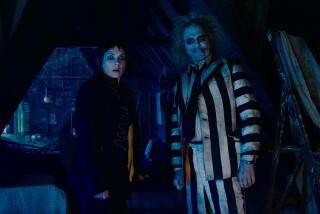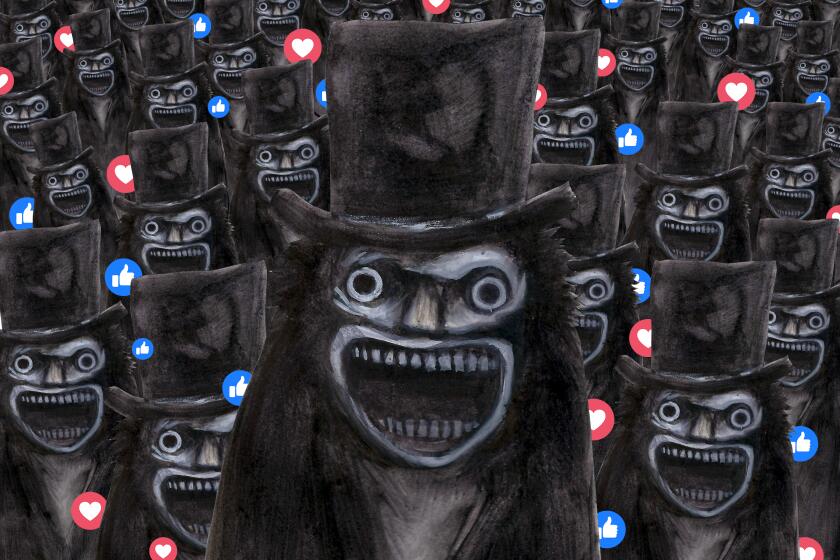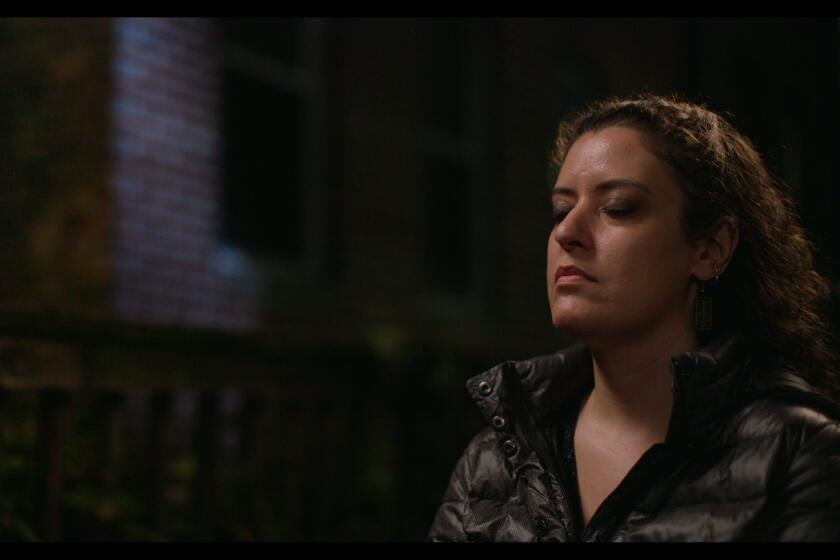‘The Nanny Diaries’
THERE’S a throwaway gag near the end of “The Nanny Diaries” that hints at some of what’s so perplexing and off-the-mark about this plodding and generic adaptation, which by rights should have been pure, eat-the-rich summer fun: Relaxing on the beach in Nantucket, a Park Avenue dowager shoos away her 6-year-old grandson when his nanny dashes off to use the bathroom. See, Grandma doesn’t want to be disturbed -- she’s on the last chapter of “The Devil Wears Prada.”
It’s not particularly funny as moments go, but it is particularly telling. Like its boring heroine, “The Nanny Diaries” ambivalently mocks what it aspires to, or aspires to what it mocks. . . . one or the other, it’s hard to tell. Based on the 2002 novel “The Nanny Diaries,” written by Emma McLaughlin and Nicola Kraus, the movie provides a more-or-less faithful enactment of the major plot points, taking care to omit most of what made the book enjoyable. Surprisingly well executed and well received for a co-written hatchet job, the novel paved the way for an avalanche of revenge-of-the-underling tales of which the far more tantrum-y and mean-spirited “Prada” was a major part. As it happened, the devil not only beat the nanny to the screen, but it pulled off the rare feat of improving significantly on its source material. So it seems especially self-defeating for a character in “The Nanny Diaries” to be so caught up in “The Devil Wears Prada,” as though the “The Nanny Diaries” were holding up “The Devil” as a standard and then failing to reach it.
It’s especially surprising given the pedigree of its writer-directors, former documentarians Shari Springer Berman and Robert Pulcini, who co-wrote the excellent Harvey Pekar biopic “American Splendor.” Nothing that was quirky or inventive about that film is in evidence here, however. The story has been reduced to so much condescending chick-flickery that adding a twist at the end pulls what remained of the movie’s teeth and turns it into straight-ahead ego-porn for DIY mommies.
The book was based on the experiences of its authors, child-psychology majors who put themselves through college working as nannies for the super rich of the Upper East Side, logging 30 such jobs between them. The characters of Nanny, Mr. and Mrs. X and 4-year-old Grayer may have been composites, but they were so dead-on they launched a thousand paranoid trips along Park Avenue. The million little details that brought to life the rarefied world of financiers, trophy wives, their neglected offspring and the put-upon servant classes that cater to them have been distilled here into a cute (but suspiciously familiar) device hinging on the main character’s new back-story.
Scarlett Johansson plays Annie, known throughout most of the film as “Nanny,” a recent college graduate who bungles her interview at an investment bank and accidentally lands a gig as Grayer’s (Nicholas Reese Art) caretaker when she saves him from being hit by a scooter in Central Park. Unlike the Nanny of the novel, an NYU child-development major from a warm, upper middle-class family, Johansson’s Annie/Nanny is a recent graduate who majored in business, minored in anthropology and is so thrown for a loop by life that she orders a burger at Bergdorf’s. Her mother (Donna Murphy), a grim-faced nurse, raised her on her own and dreams of Annie transcending her background (her dad lives in a double-wide trailer!) by way of a job on Wall Street. Annie, naturally, dreams of becoming an anthropologist, a la Margaret Mead.
This allows the filmmakers to catalog the various tribes of New York by placing them in individual dioramas at the Museum of Natural History. The diorama device is fitting, because we’re given next to no glimpse into the inner life of Mrs. X -- the trophy wife of a master of the universe whose fortress is forever being assailed by other, younger aspiring trophy wives. Mrs. X is played by the fabulous Laura Linney, who, burnished to a high gloss, perfectly embodies the brittle, miserably lonely socialite whose days appear to be an uninterrupted orgy of “me-time.” Here, however, Mrs. X has been stripped of the keening desperation that made her character so riveting in the book. Her demands are presented as little more than a catalog of injustices perpetrated on our heroine instead of as frantic attempts to live up to a standard of perfection so exotic and perpetually out of reach as to be all but designed to drive people insane.
Paul Giamatti sails through an easy stereotype as the cheating mergers-and-acquisitions mogul for whom a wife is a toy and a child is an asset, but other than lend the character an unexpected piggy coarseness, he doesn’t do much with the part. More boring still is Nanny’s love interest, the Harvard Hottie (Chris Evans), a blandly handsome stick figure who serves no purpose other than to give our heroine a shot at the life she’s come to know and love-hate. And lest we think Nanny a hypocrite in the making, we’re informed that H.H.’s life hasn’t been quite as charmed as his address and educational background would suggest. Sure, he was raised by nannies, but it’s because his mother died. (Otherwise, surely. . . )
Stripped of her determination to do a good job despite the impossible circumstances, Johannson’s character is wishy-washy and rudderless. No longer does she take it upon herself to keep hidden from Mrs. X a piece of stray lingerie that Mr. X’s mistress has purposefully planted among the bedclothes. Instead she passively allows Mrs. X to find the garment in the laundry and insist that it must belong to her.
What to make of changes like this one, other than to assume that Hollywood squeamishness precludes our squeaky-clean heroine from participating in a deception, or sympathizing with the devil? Morphing Nanny from a college student gaining valuable experience in her chosen field to an insecure, directionless post-grad comes off as the mother of all pulled punches. It was interesting to ponder the shock and awe of a well-adjusted member of the liberal meritocracy as she sank deeper into the maw of the insanely privileged classes. It’s considerably less so to be presented with a classic master-slave dichotomy.
Of course, it’s a cardinal rule of the so-called chick-flick (the genre that hates itself) that the heroine’s virtues and troubles revolve around nothing more than her under-appreciated, inoffensive cuteness. The cliché of the hapless, humiliated young girl clumsily trying to navigate the world like a dizzy guppy in a tank full of barracudas has become so compulsory that the first we see of Annie, she’s falling on the dais at graduation. Any inadvertent class issues raised during the course of her attempt to find herself, love and career satisfaction are dispatched by pitting the deserving poor(-ish) against the suspiciously moneyed. The actual poor, who at least merited some consideration in the novel, are reduced to background work here.
But the idea that a relatively privileged college girl from a good home could be so casually enslaved by a plutocratic robber baroness? In America? Today? Can’t touch that.
carina.chocano@latimes.com
“The Nanny Diaries.” MPAA rating: PG-13 for language. Running time: 1 hour, 45 minutes. In wide release.
More to Read
Only good movies
Get the Indie Focus newsletter, Mark Olsen's weekly guide to the world of cinema.
You may occasionally receive promotional content from the Los Angeles Times.








